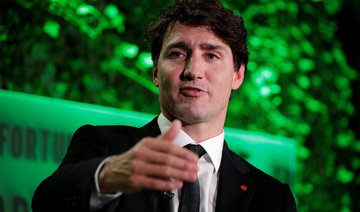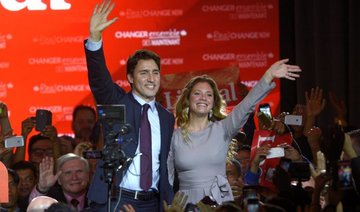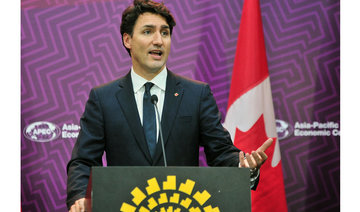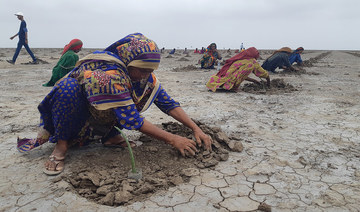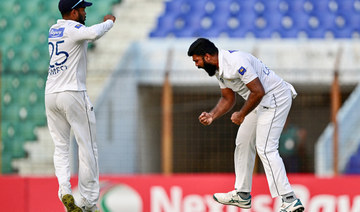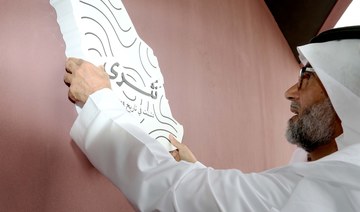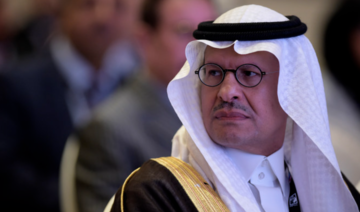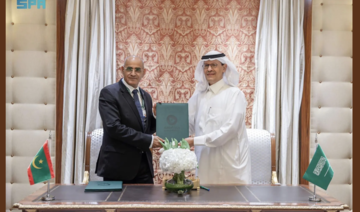MONTREAL: Prime Minister Justin Trudeau promises a “progressive agenda” for Canada’s G-7 presidency in 2018, but talks may once again hit a snag over climate change after the US withdrawal from the Paris agreement.
For Justin Trudeau, this presidency comes at a time when his government has been struggling with a difficult renegotiation of the North American Free Trade Agreement (NAFTA) with the US and Mexico, which was demanded by US President Donald Trump amid rising American protectionism.
Gender equality, climate change and economic growth “that works for everyone” are among Ottawa’s top priorities for the meeting of the world’s largest advanced economies — Britain, Canada, France, Germany, Italy, Japan and the US.
Trudeau said in a statement that he wants the talks to focus on “finding real, concrete solutions” to these issues.
The leaders of the Group of Seven industrialized nations will meet June 8 and 9 at Le Manoir Richelieu in the Charlevoix region of Quebec, a popular tourist destination 150km northeast of Quebec City.
In this idyllic setting between the sea and the mountains, at the mouth of the St. Lawrence River, global warming once again promises to be a bone of contention, as it was at the last summit in Italy, according to John Kirton, director of the G-7 Research Group at the University of Toronto.
Trump was a climate pariah at the talks in Taormina, announcing days later Washington’s withdrawal from the Paris Agreement on climate change.
In an attempt to avoid fresh tensions, Canada has proposed lumping climate change in to a broader discussion that would also include “oceans and clean energy,” according to the prime minister’s office.
Canada “quite properly” framed this segment of the talks around oceans, Kirton told AFP, noting the rise in sea levels and major recent storm damage in the US and the Caribbean.
“Every big city in the United States, except for Chicago, is on a coast,” making them “vulnerable” to climate impacts, he said.
“The mood (in regards to climate) in the United States is changing at the state level and that will quickly move up into Congress as the (2018) midterm elections approach,” Kirton predicted.
“So, (that battle) is not over yet.”
“Trump really likes Trudeau,” added Kirton, suggesting Trudeau has an opening to “find a way to change Trump’s mind” on the Paris Agreement.
Most hope a deal on a new NAFTA will be reached before the G-7 Summit, which would allow Trudeau to focus the discussion on gender and environmental issues while also seeking to sway Trump on climate.
“The only globalization that Trump has been able to stop is by not doing anything more for the United States,” Kirton said, noting the Canada-EU free trade agreement came into force this year.
“The rest of the world is just going on and doing a lot.”
North Korea, which he called the “second-greatest global extinction threat after climate change,” will also be a hot topic for the leaders.
Canada and the US will co-host North Korea crisis talks in Vancouver with foreign ministers from 16 countries in January.
Kirton is also “optimistic” that Canada’s push to include gender parity clauses in trade pacts and security arrangements will bear fruit.
“Ivanka Trump sold her dad on that,” he said.
Canada’s G-7 presidency: A ‘progressive agenda’ at risk
Canada’s G-7 presidency: A ‘progressive agenda’ at risk
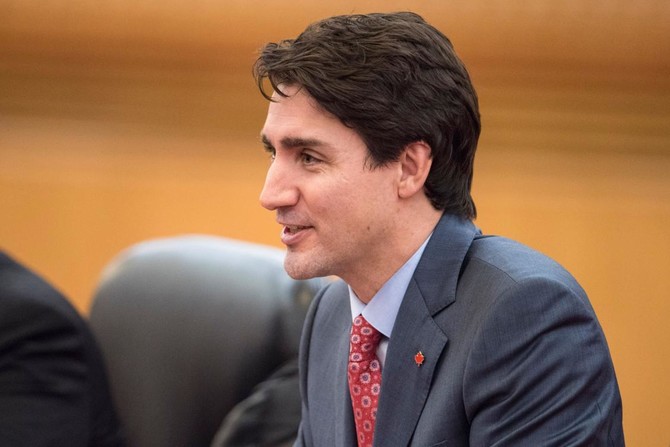
Sri Lanka joins Global South-North dialogue through Riyadh WEF meeting
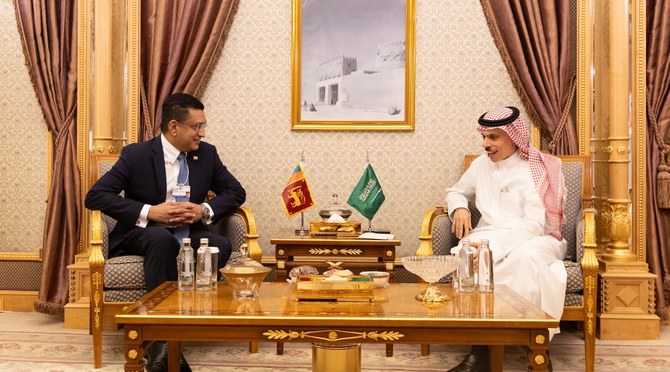
- Foreign Minister Ali Sabry was among the special meeting’s speakers
- He represented the Global South perspective at the invitation of Saudi FM
COLOMBO: Sri Lanka is trying to position itself in the dialogue between the Global South and North, its foreign minister said, following the World Economic Forum’s special meeting on global collaboration organized by Saudi Arabia.
The WEF’s Special Meeting on Global Collaboration, Growth and Energy for Development convened 1,000 global leaders arriving in Riyadh from 92 countries on April 28-29 to find actionable, collaborative and sustainable solutions to shared challenges.
The meeting saw a focus on the Global South, or countries, mostly in the Southern Hemisphere and largely in Africa, Asia and Latin America, which until recently have often been described as developing or less developed.
Sri Lanka FM Ali Sabry represented the Global South perspective at the forum’s session titled “North to South, East to West: Rebuilding Trust” alongside his Saudi counterpart, Prince Faisal bin Farhan.
“It was a great opportunity for me to showcase Sri Lanka and the challenges that countries in the Global South face, and also to position Sri Lanka as an important player, particularly in the Global South in shaping the future … for collaboration, peace and stability, rather than confrontation,” he told Arab News.
The minister was in Riyadh at the invitation of Prince Faisal, with whom he also held a meeting.
“We look forward to elevating the partnership,” Sabry said.
“We intend to sign the investment protection agreement that would probably pave the way for the inflow of investment into Sri Lanka.”
He also met other Saudi leaders during his visit to explore further cooperation possibilities.
The Kingdom has expanded ties with the South Asian island nation since last year, agreeing to broaden political consultation and launching a new employment scheme aimed at boosting Sri Lanka’s manpower exports.
Colombo has since sought Saudi assistance in developing several of its key sectors, including tourism and agriculture.
Saudi Hajj minister in Jakarta as Indonesia prepares record number of pilgrims
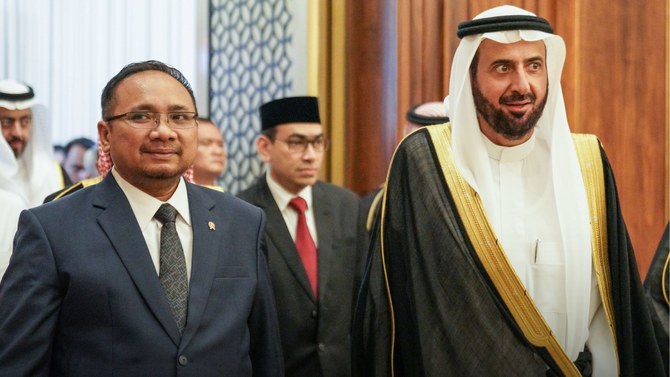
- 241,000 Indonesian pilgrims are set to perform the Hajj this year
- Saudi minister will launch tourism exhibit in Jakarta on Wednesday
JAKARTA: Saudi Arabia’s Hajj and Umrah Minister Tawfiq Al-Rabiah held meetings in Jakarta on Tuesday to coordinate pilgrimage preparations as Indonesia is going to send its largest-ever Hajj contingent this year.
The Kingdom has approved the 2024 quota of 241,000 Indonesian pilgrims, an increase of 20,000 from last year.
Al-Rabiah held discussions with Indonesia’s Religious Affairs Minister Yaqut Cholil Qoumas on ways to streamline Hajj services for the Asian nation’s pilgrims.
“I just had a long and productive meeting and discussion with my brother, the Indonesian religious affairs minister, which was focused on giving the best services and ease for Hajj and Umrah pilgrims from Indonesia,” Al-Rabiah said during a press conference.
“The Saudi government has revitalized historical and Islamic sites in Makkah and Madinah, and other sites related to pilgrimage and the journey of Prophet Muhammad … and we invite all pilgrims to come and visit these sites.”
Indonesia’s higher quota will help shorten the wait for some pilgrims by a few years, which is especially important for the elderly in the Southeast Asian nation. Many in the country wait up to 45 years for their turn, according to official estimates.
Qoumas said his interactions with Al-Rabiah had been meaningful.
“Maybe we can consider Indonesia as having received a special treatment from the Saudi government, as we are welcoming a big delegation led directly by the Saudi Hajj and Umrah minister, who are here to ensure that Indonesian Hajj pilgrims this year will get the best services from the Kingdom of Saudi Arabia,” Qoumas said.
“As a representative of the Indonesian government, we feel very grateful and thankful.”
Al-Rabiah is scheduled to inaugurate on Wednesday a Saudi Tourism Authority event showcasing the variety of travel destinations the Kingdom has to offer as it aims to attract more international visitors under Vision 2030.
Germany failing to protect Muslims from hate: Human Rights Watch
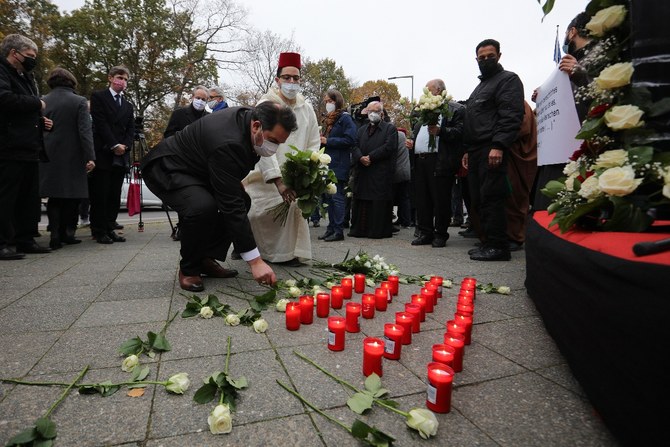
- Government ‘lacks understanding’ of racism targeting Muslim communities
- 2023 marked ‘frighteningly new high’ for hate incidents: German NGO chief
LONDON:Germany is failing to protect Muslims from growing racism amid a “lack of understanding” about the issue, Human Rights Watch has warned.
The country has yet to implement a working definition of anti-Muslim racism and frequently fails to record data on race-hate incidents, the organization said on Tuesday.
A key failing of the German government concerns its “lack of understanding that Muslims experience racism and not simply faith-based hostility,” said Almaz Teffera, a HRW researcher on racism in Europe.
“Without a clear understanding of anti-Muslim hate and discrimination in Germany, and strong data on incidents and community outreach, a response by the German authorities will be ineffective.”
Germany recorded 610 “anti-Islamic” crimes in 2022, but from the start of 2023 to September that year, the number had climbed to 686.
There are fears that the figure has further surged since the outbreak of the Gaza conflict last October.
Germany’s Interior Ministry told HRW that it could not provide data on anti-Muslim crimes from October 2023 to the year-end.
However, civil society groups in the country recorded a spike in reported incidents, leading Germany’s federal commissioner for anti-racism, Reem Alabali-Radovan, to join an EU-wide expression of concern about the rise in hate.
The Alliance Against Islamophobia and Anti-Muslim Hate, a German NGO network, documented “an average of three anti-Muslim incidents a day” last November.
The network’s chief, Rima Hanano, told HRW that “2023 marked a frighteningly new high for anti-Muslim incidents.”
Though the network collects its own internal data on the frequency of hate incidents, the German government “has yet to develop an infrastructure for countrywide monitoring and data collection,” HRW said.
The government has also classified hate incidents against Muslims as “anti-Islamic” since 2017, removing nuances surrounding the ethnic identities of victims, HRW added.
A three-year study commissioned by the government and published last year recommended that authorities “no longer dissociate anti-Muslim hate from racism,” but instead “recognize their connection.”
However, the Interior Ministry has failed to carry out the report’s recommendations, HRW said, adding: “Any focus on anti-Muslim hate and discrimination that fails to include racism or acknowledge the intersectional nature of such hostility will be unable to capture the full picture or inform effective policy responses.”
Muslim communities in Germany are a “group with a diversity of ethnicities” rather than a “monolithic religious group,” said Teffera.
“Germany should invest in protecting Muslims and all other minority communities in Germany because it is an investment in protecting all of German society.”
A gunman kills 6 worshippers inside a Shiite mosque in western Afghanistan, the Taliban say
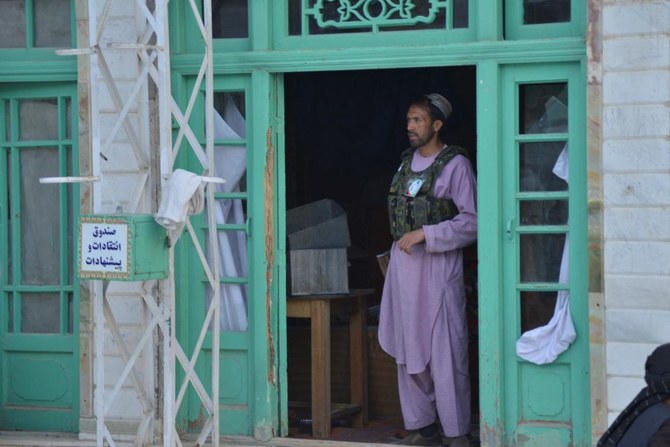
ISLAMABAD: A gunman stormed a mosque in western Afghanistan, opening fire and killing six people as they were praying, a Taliban official said Tuesday.
Local media reports and a former president of Afghanistan said the mosque was targeted because it was a place of worship for the country’s Shiite Muslim minority.
The attack happened on Monday night in the district of Guzara in Herat province, said Abdul Mateen Qani, a spokesman for the Taliban Interior Ministry. He said in a post on the social media platform X that an investigation was underway.
No one immediately claimed responsibility for the attack, which also wounded another worshipper while the attacker fled. Local media reported that the mosque's imam was among those killed.
“I strongly condemn the attack on the Imam Zaman Mosque,” former Afghan President Hamid Karzai said on X. “I consider this terrorist act against all religious and human standards.”
The United Nation Assistance Mission in Afghanistan also condemned the attack, which it said killed and wounded at least seven people, including a child. It called for urgent accountability for perpetrators and protection measures for Shitte communities.
The Islamic State group’s affiliate in Afghanistan is a major Taliban rival and frequently targets schools, hospitals, mosques and Shiite areas throughout the country.
The Taliban seized power in Afghanistan in August 2021, during the last weeks of the chaotic departure of U.S. and NATO troops from the country after 20 years of war.
Despite initial promises of a more moderate stance, the Taliban gradually reimposed a harsh interpretation of Islamic law, or Shariah, as they did during their previous rule of Afghanistan from 1996 to 2001.
Russia says United States is being hypocritical over ICC and Israel
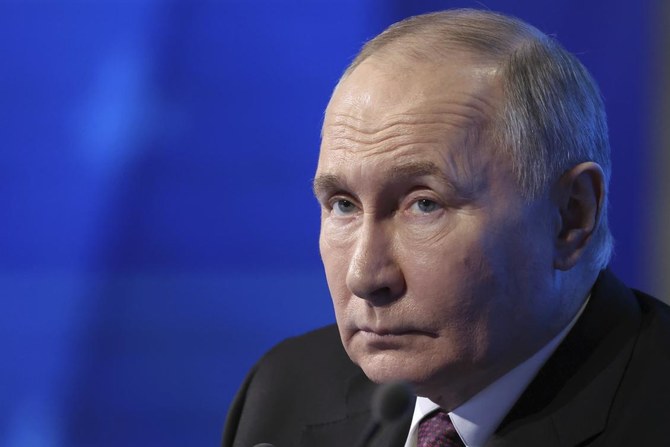
- US President Joe Biden said last year that the ICC decision to issue an arrest warrant for Putin was justified
MOSCOW: Russia said on Tuesday that the United States was being hypocritical by opposing the International Criminal Court’s (ICC) investigation of Israel but supporting the court’s warrant for the arrest of President Vladimir Putin.
The ICC — which can charge individuals with war crimes, crimes against humanity and genocide — is investigating Hamas’ Oct. 7 cross-border attack and Israel’s devastating military assault on Hamas-ruled Gaza, now in its seventh month.
White House spokesperson Karine Jean-Pierre said on Monday the United States did not support the ICC’s investigation of Israel and did not believe that the court had jurisdiction.
US President Joe Biden said last year that the ICC decision to issue an arrest warrant for Putin was justified. The United States has shared details of alleged Russian war crimes in Ukraine with the ICC.
Russia says the warrant against Putin is a meaningless attempt by the West to soil Russia’s reputation and denies war crimes in Ukraine. Ukraine says Russia committed war crimes. Russia says the West has ignored Ukraine’s crimes, a charge denied by Kyiv.
“Washington fully supported, if not stimulated, the issuance of ICC warrants against the Russian leadership,” Russian Foreign Ministry spokesperson Maria Zakharova said in a post on Telegram.
But “the American political system does not recognize the legitimacy of this structure in relation to itself and its satellites,” Zakharova said, adding that such a position was intellectually “absurd.”
The Kremlin has called the issuing of the warrant against Putin outrageous and legally void, as Russia is not a signatory to the treaty that created the ICC.
Israel is not a member of the ICC, while the Palestinian territories were admitted as a member state in 2015.
Prime Minister Benjamin Netanyahu said on Friday that any ICC decisions would not affect Israel’s actions but would set a dangerous precedent.
Israeli officials are worried that the court could issue arrest warrants against Netanyahu and other top officials for alleged violations of international humanitarian law in Gaza, Israeli media have reported.
They said the ICC is also considering arrest warrants for leaders from Hamas.


